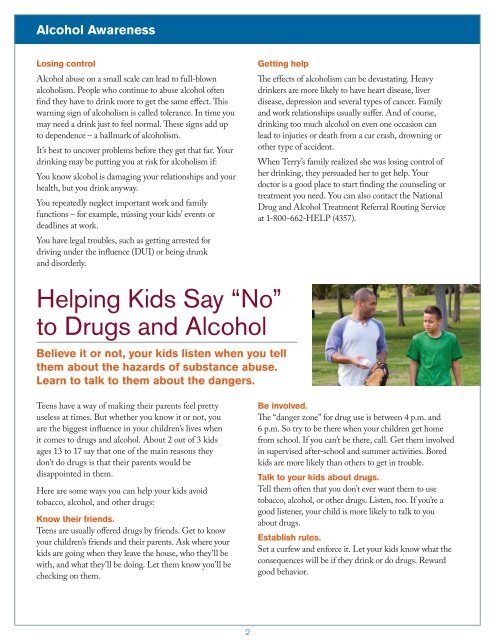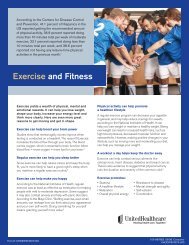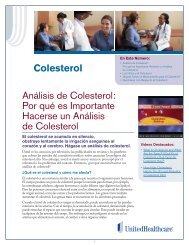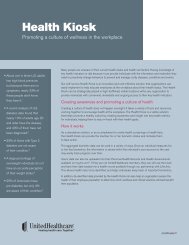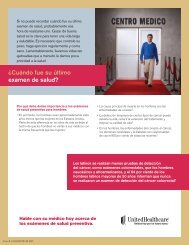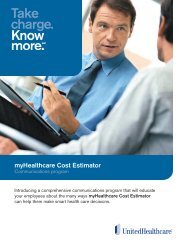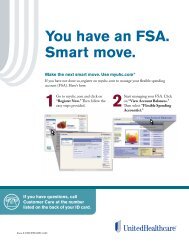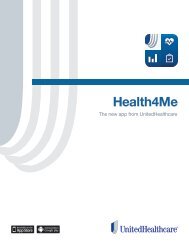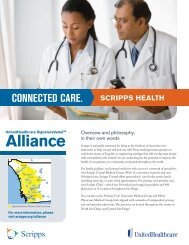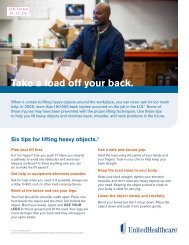Alcohol Awareness newsletter
Alcohol Awareness newsletter
Alcohol Awareness newsletter
You also want an ePaper? Increase the reach of your titles
YUMPU automatically turns print PDFs into web optimized ePapers that Google loves.
<strong>Alcohol</strong> <strong>Awareness</strong><br />
Losing control<br />
<strong>Alcohol</strong> abuse on a small scale can lead to full-blown<br />
alcoholism. People who continue to abuse alcohol often<br />
find they have to drink more to get the same effect. This<br />
warning sign of alcoholism is called tolerance. In time you<br />
may need a drink just to feel normal. These signs add up<br />
to dependence – a hallmark of alcoholism.<br />
It’s best to uncover problems before they get that far. Your<br />
drinking may be putting you at risk for alcoholism if:<br />
You know alcohol is damaging your relationships and your<br />
health, but you drink anyway.<br />
You repeatedly neglect important work and family<br />
functions – for example, missing your kids’ events or<br />
deadlines at work.<br />
You have legal troubles, such as getting arrested for<br />
driving under the influence (DUI) or being drunk<br />
and disorderly.<br />
Getting help<br />
The effects of alcoholism can be devastating. Heavy<br />
drinkers are more likely to have heart disease, liver<br />
disease, depression and several types of cancer. Family<br />
and work relationships usually suffer. And of course,<br />
drinking too much alcohol on even one occasion can<br />
lead to injuries or death from a car crash, drowning or<br />
other type of accident.<br />
When Terry’s family realized she was losing control of<br />
her drinking, they persuaded her to get help. Your<br />
doctor is a good place to start finding the counseling or<br />
treatment you need. You can also contact the National<br />
Drug and <strong>Alcohol</strong> Treatment Referral Routing Service<br />
at 1-800-662-HELP (4357).<br />
Helping Kids Say “No”<br />
to Drugs and <strong>Alcohol</strong><br />
Believe it or not, your kids listen when you tell<br />
them about the hazards of substance abuse.<br />
Learn to talk to them about the dangers.<br />
Teens have a way of making their parents feel pretty<br />
useless at times. But whether you know it or not, you<br />
are the biggest influence in your children’s lives when<br />
it comes to drugs and alcohol. About 2 out of 3 kids<br />
ages 13 to 17 say that one of the main reasons they<br />
don’t do drugs is that their parents would be<br />
disappointed in them.<br />
Here are some ways you can help your kids avoid<br />
tobacco, alcohol, and other drugs:<br />
Know their friends.<br />
Teens are usually offered drugs by friends. Get to know<br />
your children’s friends and their parents. Ask where your<br />
kids are going when they leave the house, who they’ll be<br />
with, and what they’ll be doing. Let them know you’ll be<br />
checking on them.<br />
Be involved.<br />
The “danger zone” for drug use is between 4 p.m. and<br />
6 p.m. So try to be there when your children get home<br />
from school. If you can’t be there, call. Get them involved<br />
in supervised after-school and summer activities. Bored<br />
kids are more likely than others to get in trouble.<br />
Talk to your kids about drugs.<br />
Tell them often that you don’t ever want them to use<br />
tobacco, alcohol, or other drugs. Listen, too. If you’re a<br />
good listener, your child is more likely to talk to you<br />
about drugs.<br />
Establish rules.<br />
Set a curfew and enforce it. Let your kids know what the<br />
consequences will be if they drink or do drugs. Reward<br />
good behavior.<br />
2 2


